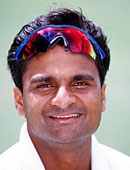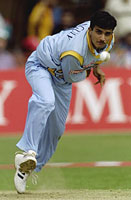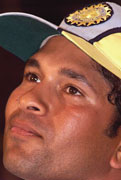The Rediff interview/Anil Kumble
'Someone asked who is the best in the world, and I said 'Me'
Faisal Shariff
Anil Kumble, to perpetuate a cliche, needs no introduction.
National coach John Wright recently told us, with a gleam in his eye, that he was "salivating" at the prospect of having Harbhajan Singh and Anil Kumble bowl in tandem.
Wright is not the only one looking forward to the prospect -- he's got a few million Indian cricket fans for company. Not to mention Kumble himself.
 His comeback, originally scheduled for the Zimbabwe tour, has now been postponed while he fights to recover full fitness -- not just of the shoulder, but also fitness as a bowler, given that it has been quite a while since he has turned his arm over.
His comeback, originally scheduled for the Zimbabwe tour, has now been postponed while he fights to recover full fitness -- not just of the shoulder, but also fitness as a bowler, given that it has been quite a while since he has turned his arm over.
Kumble spoke to us, at length, over several sessions, on all aspects of the game he loves and can't wait to start playing again. Excerpts:
What is your schedule for the comeback, Anil?
It's pretty much on schedule. I don't want to rush anything, though, I have to take this layoff in my stride. These things happen, it is part of a cricketer's career -- you just have to be philosophical, concentrate on things other than cricket. The day I feel good about myself, I will bowl. The Zimbabwe tour looked possible some time ago, but I think the South African tour in October would be the better and safer option. I'd rather skip a series than rush into something.
The layoff must have involved among other things a considerable monetary loss. You, I remember, had once spoken to me about a contract system, is this an example of why such a system makes sense?
I think it is very important to have a contract system, because it gives you a lot of security, it lets a player know how much he will earn in a year. We all love security, it is why we do the work we do. And if something like this happens, where you get injured and have a layoff, you do lose out on quite a lot of financial benefits -- which is not fair, if we are injured playing for the board and the country, then it is only right that the board look after us.
With a contract system in place, you can also rotate players. A senior player might, at times, benefit from a break -- but as it stands, you are scared to take that break because what if some younger player takes your place in the meantime? If I tell you that you're working project-to-project, or story-to-story how would you feel?
If tomorrow I tell you to cover the first Test of a series and that I may or may not pick you to cover the other two Tests, would you be able to work well? At the end of the third day of the first Test, if you were told that your work was not satisfactory and you will not be covering the rest of the series, how would your fourth and fifth articles read? Would they be nice?
Like you, we too are doing a job, we too are professionals.
 Have you spoken to the BCCI about it?
Have you spoken to the BCCI about it?
The BCCI is in fact looking into it. And I think that sooner rather than later it should happen -- I wouldn't want to see some young player losing out the way I have, or Srinath had earlier.
You have also spoken of the flip side, and how a contract system could be misused, could you elaborate on that?
Actually, it is not a major issue if we have the right checks and balances in place. It should be the duty of the doctors and the physiotherapist to regularly monitor the players and to report on their health honestly. Otherwise, there could be may be instances where there could be misuse. Like for instance, you could call your office tomorrow and say I am sick, I can't come in to work. Same difference. Like I said, it is not a major problem, given the right structure. For one thing, we should have good doctors and a good physio, and for another, the players should be trusted and in turn should live up to that trust. Like, in that example, I as your boss should be able to trust you and take your word for it that you are sick, I shouldn't be in a position of not trusting you, and having to call your house to check on you. So it is also about being responsible, and honest with yourself, you need to know that it is wrong to cheat.
One thing people who know you say, is that you are very hard on yourself..
The thing is, I go into every game telling myself that I am the guy who has to win this game for the team. So when I don't play a winning hand, I tend to blame myself, be hard on myself, whatever you call it.
Which seems, in one sense, an individualistic way to look at a team sport...
I'm not saying that, not in that sense. Look at it another way, if all 11 players walk out, each telling themselves that he has to be the one who plays a winning hand, then imagine the collective effort the team will put in! With an attitude like that, we could become unbeatable. It is about standing up to be counted, putting your hand up when it counts. It is about taking responsibility.
See, I might walk out to bat at number 10 with the side needing 60 runs in five overs to win the game. My team knows I can't do it, the world knows I can't do it. But I can't tell myself that -- I have to think, walking in, that I do have a chance. I have to go out there and give it my best shot, I need to know at the end of it all that I tried.
If you are that intense about what you do, then does failure affect you badly?
There are times when you lose your zip, you just don't have it on the day, you under perform. That is part of any activity, sport, work, whatever, you accept that and when it happens to you you ride it out. But the day you realise that it is not about that one day, it is that you are no longer capable of handling it at the highest level, you should be able to recognise that feeling, and quit. It's tough to do, to walk away, but you have to do that -- you know your team looks to you to perform, and if you think that you are no longer capable of it, of living up to that expectation, you have to have the courage to admit it and to walk.
You've been an integral part of the team for a decade now, you are among the seniormost players, you are consulted by the management even now, when you are not actively playing. Does it hurt then that you have never been considered for the role of captain?
I was vice-captain of the team, but then what's the use of being a vice-captain? It is everyone's ambition to lead a side, it is good to be captain, and I have always loved challenges. I've led Karnataka, and whenever I've led that side I've tried to talk to the player, motivate them, things like that. I was vice-captain for one year, under Sachin, and it was a good responsibility. I'm can't say whether I fulfilled that responsibility satisfactorily, that is for others to judge, I only know that I did my best. Of course, I also know that after that, I was immediately dropped.
 How do you rate Sourav as a captain?
How do you rate Sourav as a captain?
He is a good captain.
What is captaincy all about? What is the essence of good captaincy?
Captaincy is event management. It's basically getting to know what your team's strengths are; what every individual feels comfortable with. It is about a lot of things -- if you are criticising someone, it is also important to applaud and appreciate the good things he does, too. It is about giving everyone an equal amount of importance, even if he is the 14th member of the squad. He needs to know what his role is, he needs to think strategy too. It is about listening to your team-mates, about making your own decisions, and it is basically about trusting your team-mates to do their job.
What is Sourav's strength as a captain?
He leads from the front, he is always performing and when a captain performs it helps the team. He has his style, it is working for him, he is bold enough to take his own decisions and stands by them, which I think is important.
And Sachin? What do you rate as his strengths?
 Well, it is obvious that his greatest strength is that he is the team's best performer, so like I said, when a captain is performing it helps. As a captain he is positive, strong, thinking about the game comes naturally to him. Another important attribute in him is that he hated to admit defeat, he would never give up, and that is a great quality.
Well, it is obvious that his greatest strength is that he is the team's best performer, so like I said, when a captain is performing it helps. As a captain he is positive, strong, thinking about the game comes naturally to him. Another important attribute in him is that he hated to admit defeat, he would never give up, and that is a great quality.
You have been a match-winner, often our only match-winner. When a player like that comes along, it generally inspires kids to imitate him. How come your presence and success hasn't really made kids take to leg spin in a big way? Why do we have a talent crisis today?
I don't agree with you when you say that there is a talent crisis. What is happening is that we are comparing the recent spinners with the greats. The fact remains that they were greats, and cannot be duplicated. It's like the West Indies -- you can't keep comparing the guys they have today to a Holding, a Marshall, a Roberts or Garner or whoever, and those players aren't going to come back.
You said there are many spinners better than you in the probables list...
I didn't say better, I said more talented. There is a difference in having talent, and being good. Talent comes naturally, and there are many talented spinners out there. But I am still the best, when I go out to bowl. Someone asked me once, 'who is the best bowler in the world' and I said 'me'.
You see, if I don't believe I am the best, there is no point in being there. Whether I actually am the best or not is subjective, the point is to believe you are the best.
For me, mental strength is important. It is like, when I was young, and it was time for practise and I found it drizzling near my house, I would think, maybe it is not raining at the ground, since it is four kilometers away, and I would go there. I think that kind of commitment is also important. If you have that, and also this self-belief that you are the best, then you will succeed more often than not.
You have yourself admitted that your overseas record is not as good as your record in India. What do you suppose is the main reason?
It's something I need to work on. Looking back, I think one reason is that my role changes when I go abroad. When you go overseas, the focus shifts to the fast bowlers, they are the main attacking bowlers. So, maybe psycologically, I realise my role has changed, my job is to play the stock bowler, give the quicks a rest, and maybe pick up a wicket while I am at it.
I probably come into play in the second innings, more than in the first. And maybe because when in India I am looked at as the strike bowler, and when I go overseas I have to shift mentally to the other role, is one reason.
Another reason is that it is important for a spinner to have a partner to work with, which somehow I have never had abroad. Usually it is a fast bowler at one end and me at the other. I think it helps me when I have a spinner, we can work in tandem, it might be that I build the pressure and the other guy gets the wickets, but that is not important, it is that you are bowling in tandem with another spinner and that way it is easier to work on batsmen.
Like I said, it is something I need to think about.
Once, earlier, you told me that it didn'tt matter whether you turned the ball much or not...
I am a very practical player. I look at the statistics at the end of the day. Statistics are relative, yes, but I look at the last column. I consider that my job as a bowler is to get wickets, it is the job of any bowler. What he bowls is immaterial, in the final analysis. He might bowl a leg break, a googly, a top spinner, a flipper, six different balls each over, he might turn his leg breaks a mile but if at the end of the day he hasn't got wickets, then there is no point.
I don't worry about being able to turn the ball square, I don't worry that I don't have a magic ball. I worry only about taking wickets. That's my way of thinking.
I am not saying it is not important to turn the ball. Like I said, I've been doing a lot of thinking, maybe it is important for me to change the way I bowl when I go overseas, maybe there it will help to turn the ball more than I have to do in India. Let's see.
'We are special, we play with our kind of flair' - Part II
Interviews
Mail Cricket Editor